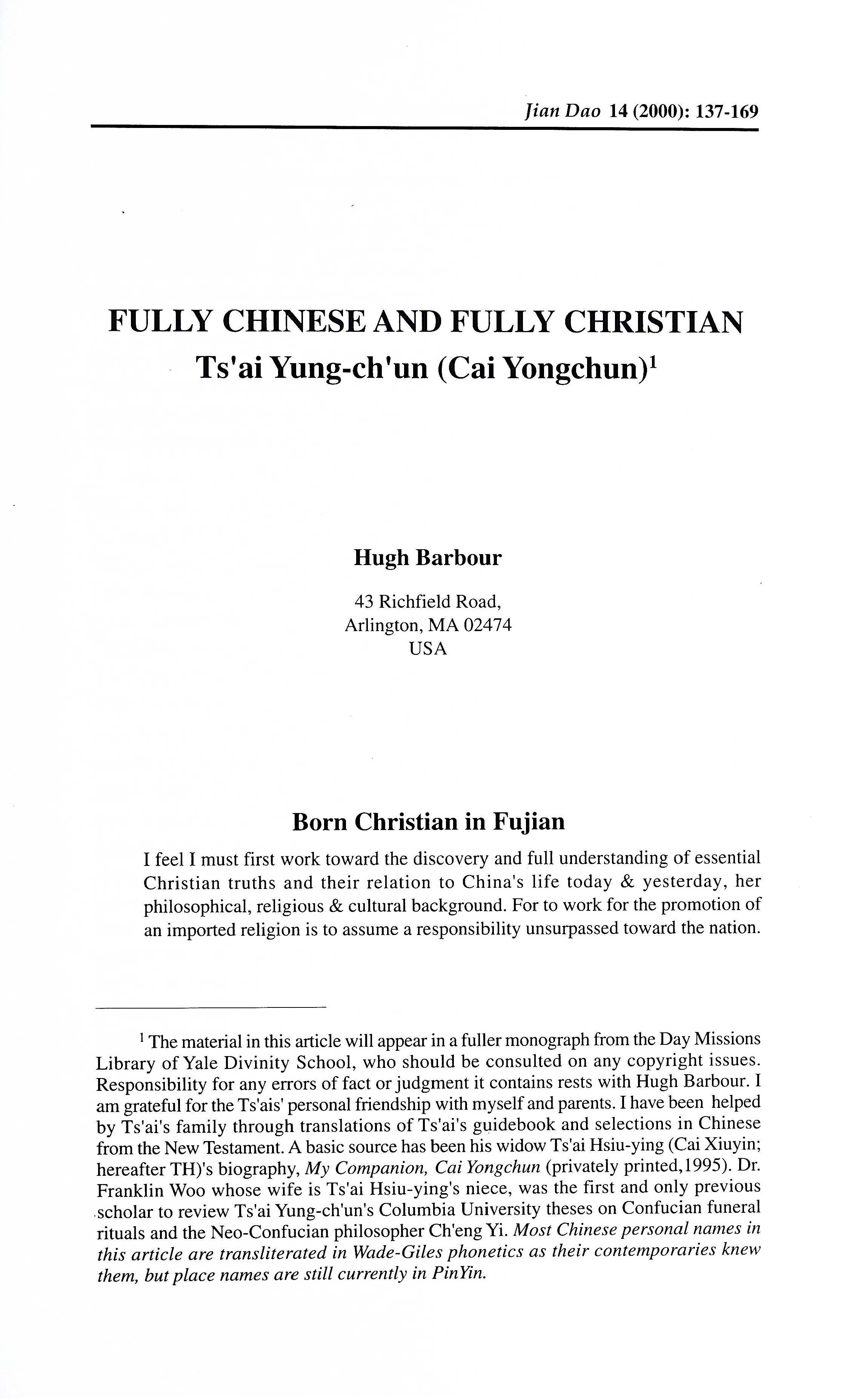Fully Chinese And Fully Christian: Ts'ai Yung-Ch'un (Cai Yongchun)(完全的中國人及完全的基督徒──蔡詠春) / Hugh Barbour 巴伯
撮要
蔡詠春(1904-1983)是中國基督教歷史的典範。本文記述他的一生。
蔡詠春生於福建,父母均是基督徒。年少時曾參與五四運動,也加入過長老會。1922年入讀北京燕京大學,主修社會學和宗教。1925年,他跟巴狄德女士合作,為中國已為人母者著寫叢書,論早期家庭教育。蔡詠春被肺結核折磨多年,也曾一度遭綁架;那段日子雖難捱,卻恢復了他對上帝的信心。後來,他在燕京大學繼續攻讀,取得社會學榮譽學位。蔡詠春與黃秀英於1933年結婚。
日本侵華年間,蔡詠春正在廈門閩南大學任教。由於他力主和平,自言恨日本的罪,卻無減其對罪人的愛,於是他被視為叛徒,被囚三星期。隨後,他一家被迫遷到香港,他感到上帝吩咐他說:「把你所有的與人共享」。接著,他分別於廣州嶺南大學和雲南任教。一段日子以後,他舉家遷往昆明,在中華基督教會的會眾眼內,蔡詠春是位巡迴牧師,及後,他應何明華主教之請,出任惠田醫院 (音譯)的院牧,後來他更被立為聖公會牧師。
戰後,蔡詠春取得獎學金,赴紐約哥倫比亞大學進修,他的博士論文研究宋代新儒學者二程之說。他又嘗試融合基督教無私的愛和社會責任,以作為重整中國的基礎。
1950年,共產黨執政,蔡詠春返抵老家中國。韓戰期間,他涉嫌跟美國人互 通消息而遭囚禁,到1952年才證實無辜得釋。1956年,他開始於吉林教學。十年後文化大革命爆發,蔡詠春在此期間吃了不少苦頭,並且被下放至偏僻村落。他在病癒並正式退休後,分別於1975年和1979年取得假期,跟女兒同住,為大學生撰寫一本新約閱讀和介紹的書,惟該書於他逝世後才得以出版。
ABSTRACT
Ts’ai Yung-ch’un (1904-1983) is a model for the history of Christianity in China. This essay may regard as a biography of Ts’ai.
Ts’ai was born in Fujian with Christian parents. He joined the May Fourth Movement and the Presbyterian Church in his youth. By 1922, he entered Yenching University in Beijing, studying Sociology and Religion. Ts’ai started working with Professor Dorothy Barbour in 1925 on writing a series of books for Chinese mothers about early family education. Ts’ai was suffering from tuberculosis for quite many years. He was being kidnapped for once. Though these were harsh days, his faith was restored. Later on, he completed a degree with high honors in Sociology in Yenching.
Ts’ai married Hsiu-ying in 1933.
When the Japanese invaded China, Ts’ai was a lecturer of Minnan University in Xiamen. Ts’ai was imprisoned for three weeks as a traitor as he spoke for hating Japan’s sins without losing love for the sinners. Afterwards, he was driven to Hong Kong where he felt God commanded him “share the lot with your people”. Ts’ai went to teach at Lingnan University in Guang-zhou and in Yunnan respectively. After some time, he moved to Kunming and was regarded as an itinerant preacher at the Church of Christ in China congregation. He also accepted the suggestion of Bishop Ronald Hall and became chaplain at the Huei-Tien hospital. He was then ordained an Episcopal priest.
After the war, Ts’ai enrolled in Columbia University in New York with scholarship. His doctoral thesis was on the works of Cheng I and Cheng Hao’s Neoconfucianism in Sung dynasty. He also put effort in combining unselfish Christian love with social responsibility as the basis for rebuilding China.
By 1950,Ts’ai was back to China when the People’s Republic reigned over the country. Ts’ai was being suspected to have American friends during the Korean War and was put under house arrest. He was cleared in 1952 and continued his teaching in Jinlin in 1956. Ten years later in the Cultural Revolution, Ts’ai suffered severely through and was exiled to remote village. He was on sickleave after his formal retirement and rehabilitation in 1975 and 1979, lived with his daughters and worked on a book of New Testament readings and introductions for university students, which was published after his death.
原載於《建道學刊》14期(2000年7月),頁137-169。
Latest Articles
新手牧者研究計劃(三):新手牧者的身心靈狀態 / 盧慧儀
2025 年 11 月 19 日
個體與關係:滕近輝思想中「深化」的靈性觀 / 倪步曉
2025 年 11 月 18 日
香港九龍塘基督教中華宣道會之起源和發展史/陳智衡
2025 年 10 月 20 日
Highlights
[電子書]困境與抉擇:「建道研究中心30週年誌慶」跨學科研討會論文集/廖炳堂、倪步曉主編
2025 年 1 月 2 日
從梧州到長洲:建道神學院125年的挑戰與恩典 / 陳智衡
2023 年 10 月 1 日
微小教會的見證/高銘謙
2023 年 6 月 1 日







